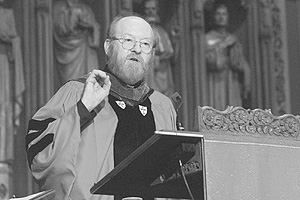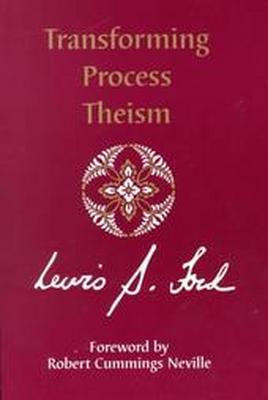
AnthonyFlood.com
Panentheism. Revisionism. Anarchocapitalism.


Foreword to Lewis S. Ford, Transforming Process Theism, State University of New York Press, 2000, xi-xiv. See also Neville's ďLewis S. Fordís Theology: A Critical AppreciationĒ and his The Impossibility of Whiteheadís God in Christian Theology elsewhere on this site.
Foreword
Three points are worth signaling to readers at the beginning of this volume.
First, Lewis Ford has made the most far reaching and imaginative transformation of process theism yet achieved. By this I mean that it is as radical as Aristotleís extension of Plato, Scotusí of Thomas, or Spinozaís and Leibnizí of Descartes. Ford is not the first, of course, to notice that Whiteheadís theology needs fixing. Bernard Loomer, Henry Nelson Wieman, and Daniel Day Williams extended process themes without much commitment to the technical arguments. Charles Hartshorne, John B. Cobb, Jr., Schubert Ogden, Jorge Nobo, and David Ray Griffin, along with their many students, have elaborated the technical categories of process philosophy to overcome difficulties or omissions in Whiteheadís presentations. Others, such as Donald Sherburne and myself, dump the theological part of process thought in order to develop its philosophy of nature. Ford has made a new philosophical theology out of the resources of process thought.
This achievement must be measured in terms of Fordís own contributions to scholarship concerning Whitehead (and Hartshorne). As the founding editor of Process Studies over twenty-five years ago, he established high standards for careful scholarship in this field. Though some have accused the discussion in and around that journal of scholasticism, which is the way it looks to those who have not mastered the technical vocabulary of process philosophy, to the cognoscenti it is a source of pride that one must know whereof one speaks in process studies. Of all the scholars who participate in this ongoing conversation, Ford is the most exact. Not only does he know the texts, he knows and has pondered the secondary literature. He is famous for invoking the form criticism of biblical scholarship to analyze Whiteheadís texts, elaborating a detailed compositional analysis of Science and the Modem World and other pre-Process and Reality writings in his The Emergence of Whiteheadís Metaphysics: 1925-1929 (Albany: SUNY, 1984). His compositional analysis is extended to Process and Reality in the present volume with respect to its three concepts of God. This is enough to justify this book to the community of process thinkers.
Fordís creative advance on process theology therefore is made with the best of its resources fully understood and deployed. This is not a loose variant on process themes or a fundamental rejection of the highly imaginative and careful process vocabulary for categoreal thinking. It is a deliberate, step-by-step revision of process claims to arrive at an idea of God far from what Whitehead would have envisioned, an idea that surmounts criticisms of early process theology that have long been standard.
Second, the present book (and some of Fordís earlier papers) is a genuine advance in philosophical theology. Although building on antecedent conceptions such as in Plato, Aristotle, Augustine, Thomas, Scotus, Hegel, Tillich, and Whitehead, it presents an idea that is truly new. Not crazy new, but responsibly new. Ford argues, with a massive technical apparatus, that God is best conceived as the activity of the future. People have said before that God is eternal, embracing past, present, and future. They have said that Godís creation in time determines the future. Process thinkers, including Samuel Alexander and others of his time as well as Whitehead, have said that God has a future that grows with the advance of time, and Pannenberg has used this to express a Christian eschatology. But no one, to my knowledge, has said that God is the activity of the future because it has been assumed that the future has no activity of its own. Ford here elaborates a responsible categoreal understanding of the future that has a proper sense of activity to account for divine-human interaction.
The significance of Fordís creative advance in philosophical theology can be seen by reflecting on two perspectives. The first has to do with philosophical theology itself. Scholars of religion have come to understand that religious beliefs, including theologies, are contextualized in cultural and religious practices. Christian theology is now commonly interpreted as arising from reflection on the symbols shaping the practices of the early Christian communities, especially their liturgies and worship practices. The contextualizing approach contrasts sharply with the European Enlightenmentís focus on belief systems in themselves, a focus that expressed itself in the mentality of early process thinkers, including Whitehead. Nevertheless the contextualizing pendulum has swung to the end of its arc and is returning toward center. Why do religious communities reflect on their practices? To understand themselves in relation to other practices and to the terms in which those other practices are expressed. The earliest Christians needed to understand their new lives in relation to their old practices, and in relation to the religious practices of their neighbors, even of their own non-Christian family members. The New Testament letters of St. Paul are replete with theology dealing with these issues. By the second century Christianity was known, and understood itself as, a Way of Life among others in the Roman world: the ancient word for such ways of life was Philosophy. The Apologists and later Christians used the language of Greek philosophy to distinguish and defend their Way among the other philosophies. Symbolically shaped practices reach for more abstract symbols that communicate across different practices when religious communities engage with alternative communities or undergo significant changes in their own circumstances. Most of the forms of European philosophy have been used in one way or another to create a theological public for European contextualizations of Christianity, as well as of Judaism and Islam.
The Protestant Reformation interrupted the extraordinarily creative and fruitful philosophical theology of the high middle ages, vigorous as it was in relating Christianity to Islam, to quasi-legendary religious cultures of the Far East, to Aristotelian thought, and the nascent powers of early-modern science. The Reformersí emphasis on the Bible, and the use of its language as primary for theology as well as worship and the interpretation of daily life, resulted in the limitation of Protestant church theology to biblical symbols. That limitation has carried down to the present day and has made altogether too much depend on finding history in the Bible, as the variously failed attempts in the last two centuries to find the historical Jesus have illustrated.
But religion is impotent unless it can address the imaginations of people at their very hearts, the imaginations that operate almost unconsciously to determine how people see their world shaped and what they take to be important. The ancient imaginative structures of the biblical world simply do not register the modern imagination as shaped by science, by the encounter with vastly different cultures than those of the religionís origins, and by the development of communications in commerce, power, and information characteristic of modernity from its earliest to its latest global stages. So alongside church theology a series of great philosophers in Europe and its colonies developed ideas of God that registered the modern imagination as well as the biblical. The great tradition from Descartes and Hobbes through Locke, Hume, Spinoza, Leibniz, Kant, Hegel, Schleiermacher, Peirce, and Whitehead now extends to Ford and his contemporaries.
The second perspective for measuring Fordís contribution is local to process theology in our situation. Whiteheadís extraordinary genius in relating theological concerns to 20th century science have been matched in areas of ethics and intercultural dialogues by thinkers such as John Cobb. This is the background of contemporary multifaceted imagination that makes process thought such a rich matrix for contemporary philosophical theology, the matrix from which Ford develops.
Two standard difficulties have limited process theology. One is that, in securing total freedom for creatures to respond to God, process theology has no way of saying that God is active as Creator, a traditional commitment of the West Asian religions. By providing a way of showing how God is activity in the future, creating the possibilities for creatures, Ford addresses at least part of this criticism. Whether creating future possibilities is enough for a theory of creation, still respecting the findings of science, is a matter for future discussion.
The second difficulty is that the God usually described by process theology cannot be known, grasped, or, to use the technical term, ďprehendedĒ by creatures. According to process theology, only something that is determined, finished in its creativity, and past, can be prehended. God, on Whiteheadís conception, is never finished at a moment (except perhaps in an eternal nature that is indifferent to creatures), and so cannot be prehensible. Responding to this problem, Hartshorne has suggested that God is not an everlasting entity but a society of entities each of which finishes and is prehensible; but there seems too little unity in a society to be either religiously responsive or conceptually coherent. On Fordís original conception, God is known as creatures know and relate to their future possibilities.
Whether Fordís new conception is adequate will be the subject of much debate. As a long-time fellow laborer in philosophical theology, I have a different approach that emphasizes the eternity of divine creation, no more associated with the future than the past or present, no more understood in terms of efficient causes than final causes. The probation of these and other competing philosophical theologies will require not only dialectical arguments concerning concepts but assessments of their sensitivity to all the movements that affect our diverse global imagination, including philosophy of nature, ethics, communications, and the involvement of other modes of thought in philosophy and theology. Which will be the best for reflecting on religion in late modernity? Fordís surely has an important place.
The third point to signal is that this book is simply superb philosophy and theology. As benefits its subject it is monumental in size. As benefits its field it is erudite beyond compare. As befits its discipline it is scrupulous and thorough in argument to a degree rarely found in this day of one-idea books. As befits our intellectual situation it is original as well as responsibly grounded. As befits its author, it is the brilliant culmination (so far) of a long career of distinguished scholarship and creative thinking. This is one of the very best philosophy books of our time, and I am honored to be associated with it by means of this foreword, and as friend and debating partner of its author.
Posted March 10, 2007